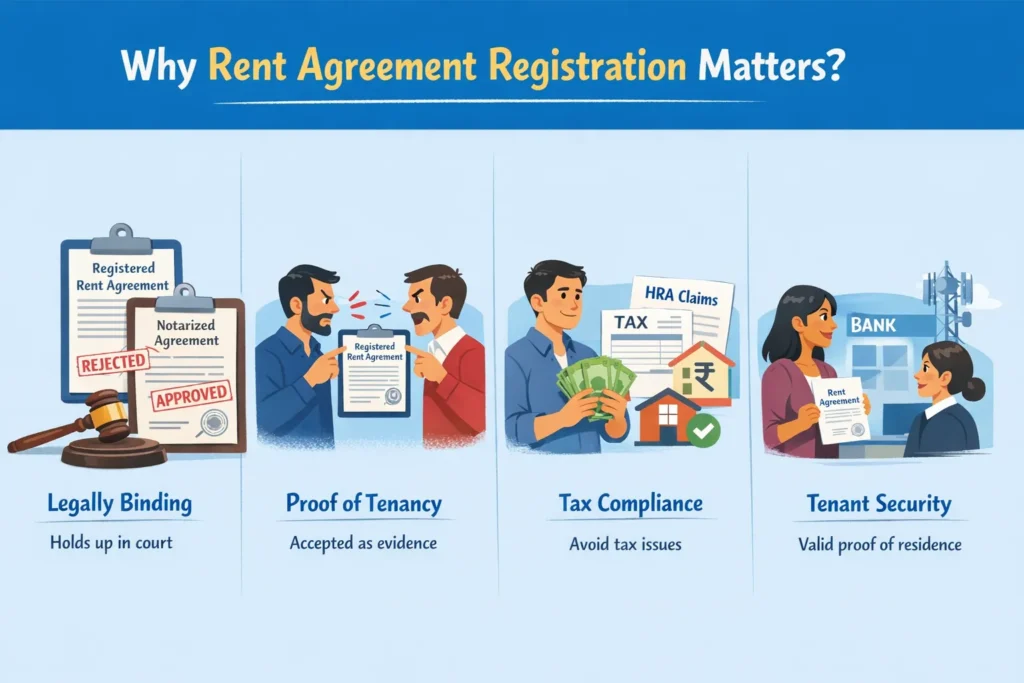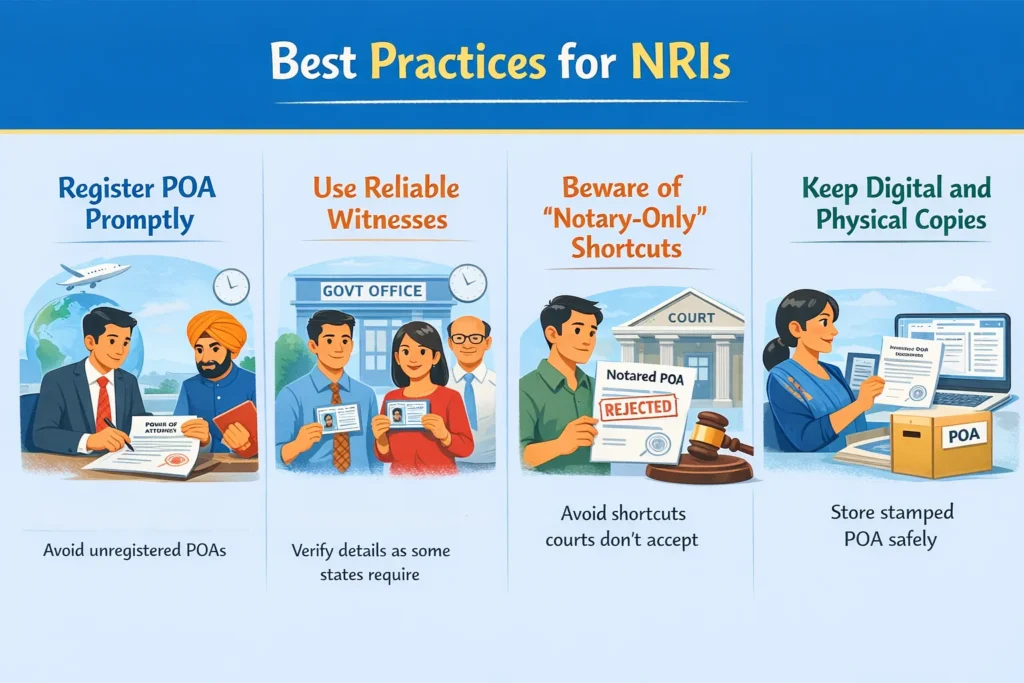
How to Register a Rent Agreement for Properties Outside Maharashtra
Imagine this. You own a flat in Delhi or Bangalore. You’re living in London or Sydney. A tenant is ready. The rent amount is settled. But then you hit the wall — how do you actually register the rent agreement without flying back to India?
That’s the reality for thousands of NRIs and absentee landlords. Renting property is easy. Registering it the right way is where things get tricky. And yet, skipping registration can lead to messy disputes, legal battles, and financial risks.
The good news? You can get it done remotely. With the right mix of Power of Attorney (POA), e-signature, legal-tech platforms, and state-specific processes, you can register your rent agreement sitting in your living room abroad.
This guide will walk you through every detail. Step by step. No jargon. Just practical advice.
Why Rent Agreement Registration Matters Everywhere in India

Some owners think: “Why bother? I’ll just sign a simple notary agreement.”
Here’s why that’s risky:
- Legally binding: A registered agreement holds up in court. A notarized one often doesn’t.
- Proof of tenancy: In disputes, only a registered rent agreement is accepted as evidence.
- Tax compliance: Without registration, you may face issues with HRA claims or property-related taxes.
- Tenant security: A registered document gives tenants valid proof of residence. Banks and telecoms often demand it.
Think of registration like insurance. You hope you won’t need it, but when things go wrong, it’s your strongest protection.
Remote Registration Options for NRIs
So, how do you pull this off if you’re sitting thousands of miles away? Here are the main routes:
1. Power of Attorney (POA)
This is the classic option. You authorize someone you trust in India to sign and complete the process on your behalf.
- The POA must be notarized and attested by the Indian Embassy or Consulate abroad.
- Once sent to India, it needs to be stamped and registered with the local sub-registrar.
- From there, the POA holder acts like the landlord and completes the rent registration.
Think of it like giving your “digital twin” the legal power to act for you.
2. State Online Portals with Aadhaar e-Sign
Some states now allow Aadhaar-based e-sign for rent agreements. This works only if both landlord and tenant have Aadhaar numbers.
- You log in, upload documents, and sign digitally.
- Biometrics may still be needed for tenants.
This option is growing but not yet universal.
3. Legal-Tech Platforms
Companies in India have stepped into this gap. They provide end-to-end remote services — drafting, biometrics, sub-registrar submission, and even couriering the registered agreement to your address abroad.
Some even offer doorstep biometric capture for tenants, and remote witness coordination. This is the “plug-and-play” model that’s becoming popular with NRIs.
Documents You’ll Need
For Landlord:
- Aadhaar Card or valid ID
- PAN Card
- Property ownership proof (sale deed, tax receipt, title deed)
- Passport photo
For Tenant:
- Aadhaar Card or valid ID
- PAN Card
- Address proof (utility bill, passport, driving license)
- Passport photo
Additional:
- Rent amount and terms
- Security deposit details
- Property address
- Names and IDs of two witnesses (can be provided remotely)
- If using POA, notarized and attested POA
State-Wise Comparison
Different states have different rules. Here’s a simple snapshot:
| State | Online Portal Available | Biometric Needed | Stamp Duty & Fees | Typical Time |
|---|---|---|---|---|
| Delhi | Yes, e-registration | Yes | 2% of avg annual rent + deposit | 2–4 days |
| Karnataka | Yes, online option | Yes | 1% of rent + deposit | 3–5 days |
| Uttar Pradesh | Partial online | Yes | 2% of annual rent | 4–7 days |
| Tamil Nadu | Online via portal | Yes | 1% of annual rent | 2–3 days |
(Tip: Always confirm on the latest state registration portal, as rules and fees change.)
Stamp Duty, Registration Fees & Reforms
Stamp duty is the state’s cut. It varies widely. Maharashtra and Karnataka have relatively straightforward rates, while Delhi and UP can be steeper.
Reforms are happening fast. Many states now allow e-stamping, which saves trips to treasury offices. Always check if your state portal supports it.
Best Practices for NRIs

- Register POA promptly: An unregistered POA can derail the process.
- Use reliable witnesses: Some states require witness verification. Get their details early.
- Beware of “notary-only” shortcuts: Courts don’t accept them.
- Keep digital and physical copies: A soft copy is handy, but keep the stamped physical copy safe.
FAQs
1. Is registration mandatory for 11-month agreements?
No, it isn’t mandatory. That’s why many landlords pick the 11-month format. But here’s the catch: if you don’t register, the agreement won’t carry much legal weight in court. If you want full protection, registration is always safer.
2. Can an NRI register remotely without Aadhaar?
Yes. You don’t have to be in India or even have Aadhaar. You can either:
- Use a Power of Attorney (POA) so someone signs on your behalf, or
- Go through legal-tech services that handle remote registrations for NRIs.
Aadhaar is just one way. It’s not the only way.
3. What if the tenant refuses biometric verification?
Then the registration can’t move forward. Biometric or Aadhaar verification is a must for tenants in most states. If the tenant isn’t comfortable, you’ll either need to convince them, or look at other options like POA, depending on the state rules.
4. How long does the process take outside Maharashtra?
Typically between 2 to 7 working days, depending on the state. Maharashtra is faster because of its e-registration setup. Other states may take longer if physical biometrics or stamp duty verification is needed.
5. Is POA better than using legal-tech services?
It depends:
- POA: Good if you already have a trusted family member or friend in India.
- Legal-tech service: Better if you want a professional team to handle everything, including drafting, witnesses, and follow-ups.
If convenience matters more than cost, most NRIs prefer legal-tech platforms today.
6. Can a rent agreement be made in a different state?
Yes, but the agreement must be registered in the state where the property is located. For example, if your property is in Delhi, you can’t register it in Maharashtra. Property registration is always tied to the property’s jurisdiction.
7. Does a rent agreement need to be registered in Maharashtra?
Yes, if the term is more than 11 months. For 11-month agreements, many people skip it, but registration makes it legally enforceable. Maharashtra also has one of the most advanced online registration systems, so it’s worth doing.
8. How to make a rent agreement if the owner is abroad?
Two main ways:
- Power of Attorney (POA): You authorize someone in India to do it for you.
- Legal-tech platforms: They guide you through document upload, biometrics, and remote registration without you flying back.
Both work. It depends on whether you want to handle it privately or through a service provider.
9. What is the cost of a registered rent agreement in Maharashtra?
The cost has two parts:
- Stamp duty & registration fee: Usually between ₹1,000–₹2,500, depending on rent, deposit, and property size.
- Service provider charges (if used): Can range from ₹500 to ₹3,000, depending on the platform.
Total cost: roughly ₹1,500–₹5,000.
10. Is a notarized rent agreement valid?
A notarized agreement is valid as a simple contract, but it doesn’t have the same legal weight as a registered one. Courts generally don’t accept notarized-only rent agreements in disputes. For full protection, go for registration.
11. Who pays for a rent agreement?
Usually both landlord and tenant share the cost — especially the government fees (stamp duty and registration). Service provider fees can also be split, but sometimes landlords cover it to make the deal smoother.
12. Is a rent agreement accepted as address proof?
Yes, but only if it’s registered. Banks, passport offices, and telecom companies usually accept registered agreements as proof. A notarized agreement won’t work in most cases.
Conclusion
Registering a rent agreement outside Maharashtra may sound complicated. But with POA, e-portals, and legal-tech services, it’s now simpler than ever.
Think of it like ordering groceries online. You don’t have to visit the store, but you still get what you need, legally and securely.
For NRIs and absentee owners, this is more than convenience. It’s peace of mind. Your property is protected. Your tenants are covered. And you don’t have to step on a plane just to sign a piece of paper.
Pryank Agrawal is the Founder and CEO of Housewise, a leading property management startup serving customers across 45 countries with operations in 22 Indian cities, including Pune, Bengaluru, Hyderabad, Chennai, Delhi NCR, and Mumbai. An engineering graduate from IIT Roorkee, Pryank brings extensive experience from the software industry. His passion for leveraging technology to solve real estate challenges led him to establish Housewise, simplifying property management for homeowners worldwide. After persistent requests from existing customers to address other challenges faced by Non-Resident Indians, he founded MostlyNRI, a dedicated portal assisting NRIs with taxation and financial asset management in India.
